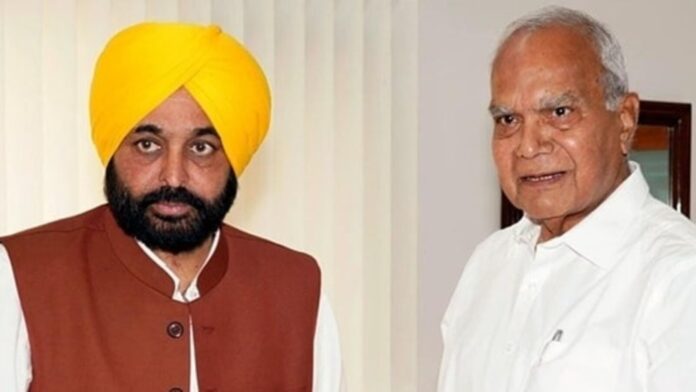The Supreme Court rejected Punjab Governor Banwarilal Purohit’s argument that the state Vidhan Sabha session, which took place on June 19–20, 2023, was not constitutionally valid. Instead, the court asked Purohit to “proceed to take a decision on the bills that have been submitted for assent on the basis that the sitting was constitutionally valid,” warning that any attempt to cast doubt on the legislative session would be fraught with great perils to democracy.
“Keeping in mind the well-established principles previously mentioned, we believe that there is no legitimate constitutional foundation to question the legitimacy of the Vidhan Sabha session that was held on June 19 and 20, 2023. Any attempt to question the legitimacy of the legislative session would be extremely dangerous for democracy. By adjourning the House sine die, the speaker—who is acknowledged as the protector of the House’s privileges and as the body recognised by the Constitution as the House’s representative—was acting appropriately within his authority. According to a three-judge panel led by Chief Justice of India D.Y. Chandrachud and made up of Justices JB Pardiwala and Manoj Mishra, the House’s June 19 and 29, 2023, convening was within the bounds of Rule 16 of the Rules of Procedure and Conduct of Business of the Punjab Vidhan Sabha.
In response to a plea from the Tamil Nadu government alleging that the state governor had refused to sign legislation that the assembly had submitted, the bench also sent notice. “The problems give rise to grave concerns. According to the tabulated statement, up to 12 pieces of legislation that were submitted to the governor under Art. 200 do not seem to have prompted any more action. The bench stated that other issues, such as requests for sanction, early prisoner release, and appointment requests, are also pending.
In its decision on the Punjab petition, the bench stated that the Governor was not permitted by the Constitution to cast doubt on the legitimacy of the House session. The members of the legislature who have been properly elected make up the legislative assembly. The decisions made by the speaker on adjournment and prorogation control the House during the Assembly’s term.
The court stated, “We are therefore of the opinion that the Punjabi governor has to move forward with making a decision regarding the bills that have been submitted for assent on the basis that the House sitting that was held on June 19 and 20, 2023, was constitutionally valid.”
According to the court, “real power vests in the elected representatives of the people in a parliamentary form of democracy.” Members of the state legislature, or Parliament in some cases, make up the governors in both states and the central government. As a result, the legislatures in the state and the centre have the authority to hold government officials accountable and scrutinise them. The governor holds the title of head of state, having been appointed by the president. The fundamental tenet of constitutional law, which has been faithfully upheld in the years since the constitution’s adoption, is that the governor acts with the support and advice of the council of ministers, with the exception of those areas in which the governor is granted discretionary authority by the constitution. This notion is based on the solid constitutional tenet that the elected branch of government is fundamentally granted the authority to make decisions that impact the governance of the state, or the country, as the case may be. The governor is supposed to lead the government on issues pertaining to the constitution as a statesman of the constitution.
Therefore, the meeting was just adjourned rather than prorogued, and the budget session was rescheduled for June rather than a new monsoon session. There was no need to wait for the governor to call a new session because this one was not. As a result, the June session was held without waiting for a request from the governor. Recall that the Punjab Assembly’s monsoon session was only called in March of this year due to court intervention. When the governor refused to call a budget session in defiance of the council of ministers’ suggestion, the state government filed a case with the highest court.






